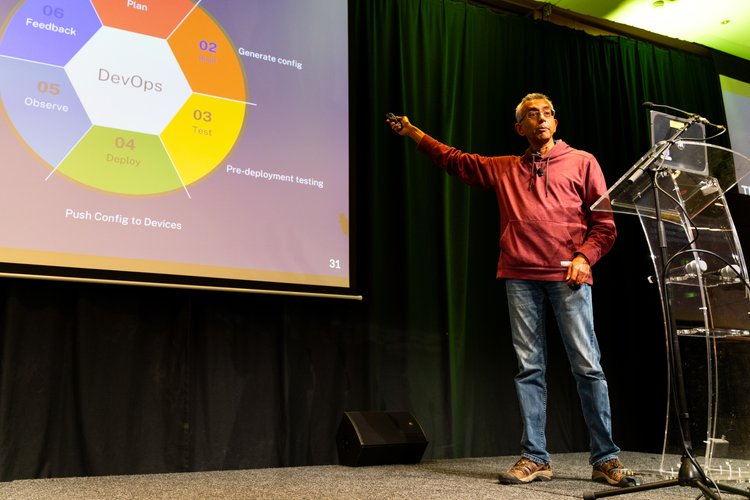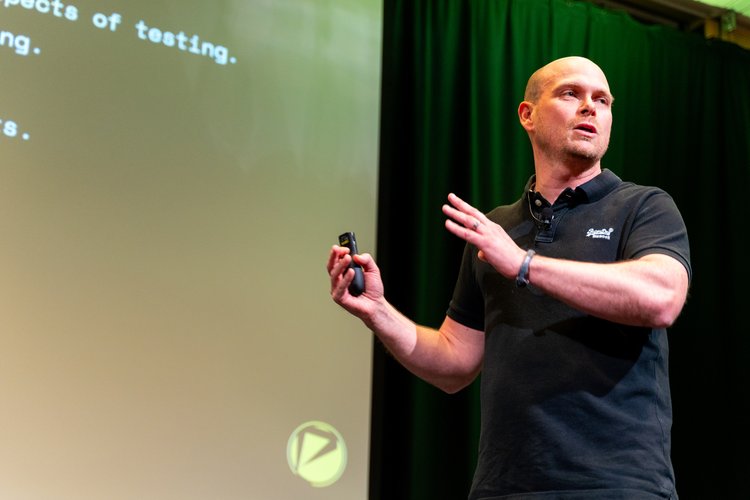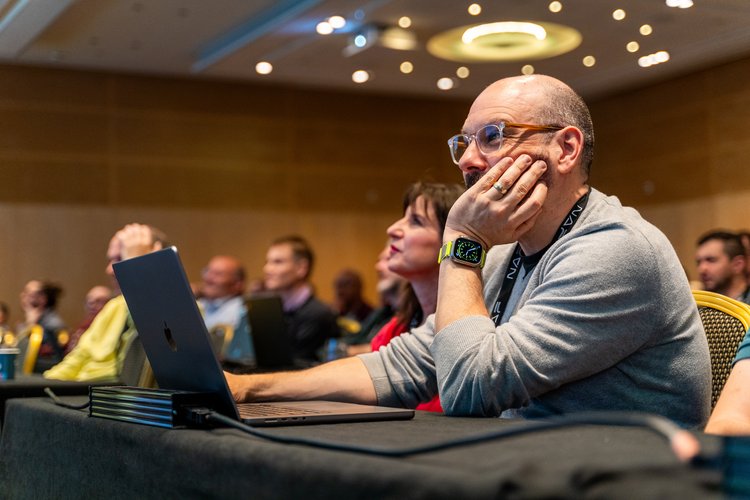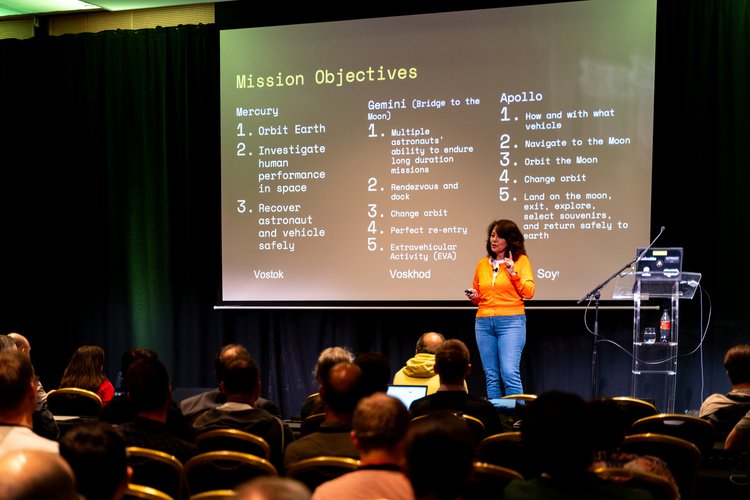Intro
If you are expecting my alter-ego to pop up and start the usual round of questions, he is sitting this one out. When I got back from Autocon1 my head was still buzzing for a week. I don’t know if the short stay had something to do with it (just 3 days) or maybe the fact that I didn’t have to walk 17Km per day, or constantly switch between cold and hot, or run between sessions across a big campus (like in Cisco Live).. but I had a blast!
Location
Amsterdam is a city I have come to love. At least what I have seen so far. Beautiful buildings and streets, parks, people are cool and calm, going anywhere with mass transit is a pleasure rather than cause for anxiety (come to Athens, I will show you, once, and then we will go by car), especially above ground.
The conference was held at the Hilton, great choice for the size of the conference (around 400 people), good spot to explore the rest of the city if given some time. I wasn’t lucky enough to be at the same hotel with everyone else but stayed closer to the city center, at walking distance of the canals, the museums and the Vondel park.
The set
Why the title, “The Undiscovered Country”? Well, does it remind you of anything?
I am drawing this from Star Trek VI, a toast made by Klingon Chancellor Gorkon, during dinner hosted at the Enterprise for the Klingon emissaries, referring to Shakespeare’s play, Hamlet, but with a small twist. Hamlet uses this in his famous speech, “To be or not to be”, where “The Undiscovered Country” refers to the Afterlife, “The undiscovered country from whose bourn no traveler returns“. In the movie though, “The Undiscovered Country” is a reference to ‘The Future’.
That’s definitely fitting. It’s an existential question, which is developed across the movie. The old world, resisting to change, clinging to their ways, choosing conflict or even glorious death in battle, rather than accepting what new situation is arising and denying any help to overcome their problems from wherever it may come. The movie is full of Shakespeare references but also philosophical context, contemplating fear, sacrifice, acceptance, trust, and faith. All related to change. All those are subjects that have come up a lot in the last few days during Autocon1.
The Tribe
The council of elders
If we look back to Autocon0, this was the motto for the conference: “The first conference that dared to ask: Why haven’t we seen full adoption of network automation, yet?“. It’s all about change, and the frustration about not seeing enough progress. Autocon1 seemed to have a similar setting. However, in this second iteration, even after a few months, I believe that this round of talks and presentations, carried the discussion a little further, although to make sure, I should probably watch all the videos from the first conference, posted in their Youtube channel: https://www.youtube.com/@networkautomationforum.
All photos are linked from the NAF/Autocon1 website, you can find more event photos there and the presentation slides have just gone up as well: https://github.com/Network-Automation-Forum/handyinfo/tree/main/docs/autocon_coverage/slides/AutoCon1


A lot of the presenters talked a lot about the challenges they faced and acknowledged that they were not able to overcome all of them, yet it seems most have been able to make progress and reach ambitious goals even with some level of compromise.

A lot of procedures and tooling was presented (e.g. CI/CD with Gitlab, Ansible, Nornir, Nautobot/Netbox, Containerlab, etc), coupled with what the vendors and integrators (Cisco, Arista, Nokia, NTC, OpsMill, Itential, NetboxLabs, IP Fabric, etc) were showcasing in the next room, a lot of “what to do” and “what not to do”, bitter real world truths, failure/success stories, building trust, and some great announcements, like kubenet from Nokia: https://www.nokia.com/blog/kubenet-making-network-automation-more-consumable/, Infrahub’s beta release, and Netbox Cloud free tier.
Tribal heroes

Whether the presenters chose to share their ‘feats of strength’ (so to speak) or lessons learned and humorous advice (Shannon Byrnes: “Don’t DoS your TACACS server!“), it was clear how knowledgeable everyone was and that their path to knowledge has been a long and hard one.

At the end of each talk, questions made offered good starting points for great discussions that followed in the halls outside the main stage, in the next room where the vendors and integrators showcased their products and offerings, but also in the slack channels for the conference, hosted at the Network Automation Forum Slack.
The bard

If you need a summary of what was presented, I will direct you to the excellent summary posts on LinkedIn by Packet Pushers’s Ethan Banks, who was on site with his keyboard on fire, capturing all the essential points of every presentation and pushing them online almost before the next speaker took to the stage. Some blog posts have emerged in the meantime, such as Urs Baumann’s take : From X25 to Kubernetes: Key Takeaways from AutoCon1, Mark Coleman’s recap on LinkedIn and I am sure more will have appeared by the time you read this.
I have to admit that there was some market penetration in the Conference, regarding vendors and integrators but also trainers! I think it’s natural, there is a need for sponsors who are actually relevant but the fact that there even is a market for this space now, is another thing to be thankful for, as it’s another sign that this space is growing.
Tribal meeting

Autocon1 was not exactly the first network automation conference in Europe (if one counts the NetDevopsDays) but I am pretty sure it was the first one most of the people there attended. We were all attracted and thrilled by the tech behind this, the new tools (torero, infrahub, slurpit, netpicker, tetc), the amazing achievements by other members of the community. But most importantly, we were relieved with the realization that we are not alone in our struggles, that others have walked the same path as we have, that we are understood, that we grow stronger and richer by sharing our experiences and coming together.
I know, it sounds like a cliche, right? Well it shares the fate of many other cliches: It’s true. And it feels more true to those who spent many years developing their skills and infrastructure and trying to bring around change while facing adversity.
Smoke by the fire

I feel my focus was mainly on that side. I have been practicing network automation since a little after 2007 starting with Tcl/Expect and later with Perl, before acting as a network automation advocate since 2016, learning python, joining the community and helping it develop further in whatever way possible for me, while at the same time realizing that this is a discipline, a new way of doing things and that “we are all in this together” (Stuart Clark, Philosopher). So for me, the conference was like joining my tribe after isolation. It was like a long therapy session.
After the happy first stage of realization that we all share similar experiences and have developed similar tooling infrastructure (well apart from the occasional trolling against Ansible by the Nornir fans), the main question brought on by the conference came into focus: Where do we move on from here? Why haven’t we seen full adoption of network automation, yet? And how do we each face our own challenges?
Words of the wise
A lot of what the presenters said sounded logical even if a little bitter or harsh. I heard:

- “We need corporate buy-in!”
- “We also need user buy-in!”
- “Don’t expect standards uniformity by the vendors! It will never happen!”
- “Your projects don’t need to be perfect, just create something that works!”
- “Stop developing your projects like you will once have an army of developers, face it, you are stuck with maintaining it for the rest of your life!”
- “The team’s unity comes first! If someone threatens it, they are out!”
- “Listen to your users!”
- “But keep your beating stick close!”
- “Don’t let anyone type anything!! If they can fat-finger something, they will!”
- “You need to figure out in what stage you are in your development and decide if you are ready for the next stage or you are fine where you are for now“
But there was also:

- “We don’t have enough people coming into networking, new IT graduates go to AI instead!“
- “While network engineers see programmability as an upskill, software engineers see networking as a downskill!“
- “At some point you just need to sit down and learn those new things. It won’t happen automagically, you need to put in the work for it“.
- “I haven’t seen my kid in weeks!“
- The little bunny (if you know, you know).
- “I have sacrificed my health (and my already non-existent gaming time)“
- All the different versions of “I am tired” or “I am close to burnout“, “I have too much on my plate“, “I/we need to realize X and Y “
I can add a few of my own. I have talked with others in the conference corridors and even put in my own questions towards the speakers about the different levels and ways we reach this stage of frustration. It can be broken down to several points. I think that this conference helped me find answers to most of them:
- Is this it? Is this the top of what we can do? – No, but you must first come to terms with reality in a number of ways and adapt.
- Is what we are currently doing enough? – Concentrate on what is possible, stop chasing perfection, enjoy every small win and make use of it, take ownership.
- Do we need more tools? – Perhaps. It depends. First do what you can with what you have, concentrate on results. Reevaluating your course and infrastructure is important, when the time is right.
- What do we do if the team is not exactly on board? – Take your time, listen, see points above. There is no easy answer here.
- When is it time to give up? – That’s a hard one. No one knows your own limits, your particular circumstances, your environment better than you do. But sharing and communicating can help you reach a mature decision, so take your time and reflect.
Back to your tent!
I had trouble with the last two. Talking with everyone and listening to what they are going through made me realize that my main issues in my own environment don’t have an easy solution:
- I don’t have the power to drastically change things in a small amount of time.
- There are not enough people for this effort in my environment and those who are in close vicinity have to face their own struggles.
- The main problems come from relationships and situations that are probably not going to change anytime soon but will continue the same way for years ahead unless some cataclysmic event happens.
The end of the frustration
After facing reality, and talking with friends, I came to the conclusion that this frustration is not necessarily a bad thing. It has brought everyone together in this community. I wouldn’t have come to Amsterdam without it. It was a similar situation for me in Feb 2018, when I had the pleasure and luck to speak to Michael Koons (at the time SVP of SEs at Cisco) during Cisco Live Europe in Barcelona: I asked him about the direction Cisco was taking with Devnet and Programmability and how serious and determined they were about it. He assured me they totally & seriously meant business and explained in detail, providing context. That was just the push I needed at the moment to strengthen my belief that I was moving in the right direction.
Maybe this now will be another starting point for me, a motive to jump ahead and change once more the level of my engagement. Maybe that’s where we all are at this point. Before a giant leap ahead.
You must have Faith!
Mr. Spok’s words come to mind from the same movie, “The Undiscovered Country”. A beautiful Kim Cattrall, speaks to him, anxious about change that is coming:
“Sir, I address you as a kindred intellect. Do you not recognize that a turning point has come to the affairs of the Federation?“
To this, Spok’s response is:
“History is replete with turning points Lieutenant, you must have faith!
– Faith?
– That the universe will unfold as it should.”
So this is what I take with me from Autocon1. Change is here. The are a lot of hard situations to face and we have to deal with a lot of our own frustration. But we need to accept reality, use the difficulty and adapt, take our time, and have faith in the future (and look at all those new toys, I mean tools!). After all, “Time is on our side” (I will let you look that one up on your own).
Autocon2 will be in Denver in November (Remember remember). I am probably going to try and come back when they land in Europe again, next year (I sure hope so, we absolutely have to keep meeting like this)!
To my buddies in NetAutoGr: Next time we all go with T-shirts, ok?
